Newcomers and SIFE can analyze and participate in rigorous lessons with grade level content.
You can listen to this week’s podcast right here:
Listen to “BAP028 Rigor for Beginning English Learners” on Spreaker.
I saw evidence of this in Thames Valley DSB (TVDSB) last week. This show recaps some of what I learned and what I shared with these amazing teachers. I start this show with learning about a language vs. acquiring a language. I’ve learned a great deal from John Seidlitz and Stephen Krashen on this. I talk about my understanding of second language acquisition research along with the work of Daniel Pink on motivation. You’ll also hear about the QSSSA questioning strategy and Language Experience Approach. If you’d like to see these, you can watch this video I released a few weeks back where I model these techniques with newcomers.
In the show, I mention being in Mr. Chams math class at Cartier Elementary. 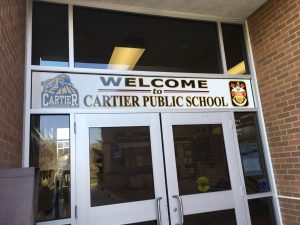 I was delighted to see the engagement of these refugee students who had missed years of formal education. They are in “LEARN” classes which address their needs for missing years of education and also beginning stages of target language acquisition.
I was delighted to see the engagement of these refugee students who had missed years of formal education. They are in “LEARN” classes which address their needs for missing years of education and also beginning stages of target language acquisition.
 Mr. Chams was working with the students in a way that built their language and also honored their culture. I was there with Jeffery Robinson and we were both blown away by the support and instruction being given to these very capable students.
Mr. Chams was working with the students in a way that built their language and also honored their culture. I was there with Jeffery Robinson and we were both blown away by the support and instruction being given to these very capable students. 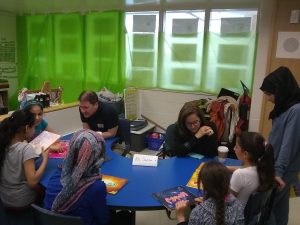 In the show I discuss the reasons that we are able to accelerate the content knowledge and also language acquisition of these ELD (English Language Development) learners / SLIFE (Students with Limited or Interrupted Formal Education)
In the show I discuss the reasons that we are able to accelerate the content knowledge and also language acquisition of these ELD (English Language Development) learners / SLIFE (Students with Limited or Interrupted Formal Education)
In the podcast I point out some of the high impact strategies I observed. First and foremost, this teacher believes that the students are able to close their gaps quickly and has a high bar for academic learning in this class. He has spent a significant time making sure that students comprehend the math concepts and also uses the academic terms during instruction. 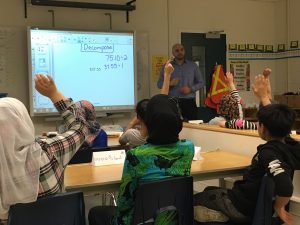 He offers students opportunities to explain their thinking and he is scribing the math language they use so that the entire class has a visual of the language of math they are using.
He offers students opportunities to explain their thinking and he is scribing the math language they use so that the entire class has a visual of the language of math they are using. 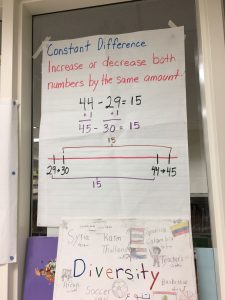
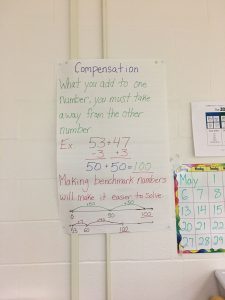
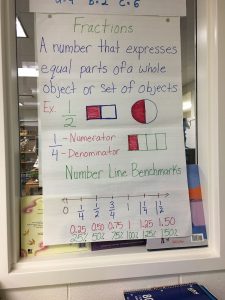
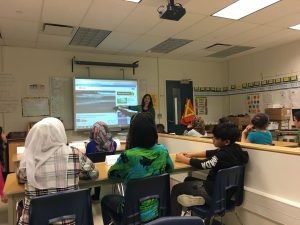 I was delighted to be in this class with Natalee Wales and Jeff Darling who support the LEARN teachers in TVDSB. I had the opportunity to watch Natalee teach and also the chance to work with these students in literacy work stations. Hats off to everyone in this program!
I was delighted to be in this class with Natalee Wales and Jeff Darling who support the LEARN teachers in TVDSB. I had the opportunity to watch Natalee teach and also the chance to work with these students in literacy work stations. Hats off to everyone in this program!
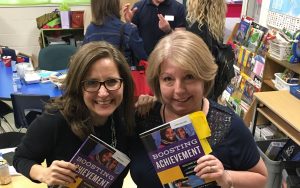 In the afternoon I worked with all of the LEARN teachers to break down the challenges we face with this demographic but also to identify the advantages these students have. We reflected on Mr. Chams lesson and I modeled the QSSSA questioning technique because it has been very effective in my classroom. I offered some other techniques regarding objectives and Language Experience Approach. I was happy to see PLN friends like Lynda Balcom.
In the afternoon I worked with all of the LEARN teachers to break down the challenges we face with this demographic but also to identify the advantages these students have. We reflected on Mr. Chams lesson and I modeled the QSSSA questioning technique because it has been very effective in my classroom. I offered some other techniques regarding objectives and Language Experience Approach. I was happy to see PLN friends like Lynda Balcom.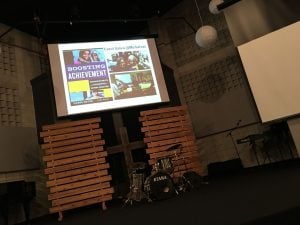
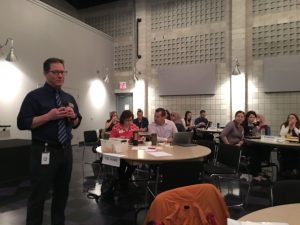 The following day was my 6 hour, standard Boosting Achievement training. It was wonderful to be with so many passionate teachers of English learners.
The following day was my 6 hour, standard Boosting Achievement training. It was wonderful to be with so many passionate teachers of English learners.  The training was very well received and we were all thrilled to have an authentic African lunch as well as beautiful dancing by some students who have come to Canada from Nepal.
The training was very well received and we were all thrilled to have an authentic African lunch as well as beautiful dancing by some students who have come to Canada from Nepal. 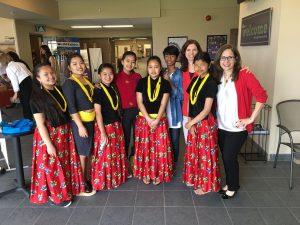 These Bhutanese refugees amazed us with their talent and confidence. They are a perfect example of how we must first look for the gifts SLIFE students bring to our communities. We can honor and even leverage those gifts to partner with students in ways that will help them with their academics and their acclimation to their new land.
These Bhutanese refugees amazed us with their talent and confidence. They are a perfect example of how we must first look for the gifts SLIFE students bring to our communities. We can honor and even leverage those gifts to partner with students in ways that will help them with their academics and their acclimation to their new land.
Thank you Stephanie Morrissey for this great tweet:
A fantastic day of PD with @MsSalvac including Bhutanese dancers, African lunch and amazing classroom strategies for all learners! #blessed @TVDSB #tvdsb_ESL pic.twitter.com/9L5bNHt3DE
— Stephanie Morrissey (@SMorrisseyESL) May 4, 2018
 My final day was with Denise Taylor-Edwards at Westminster Secondary School. What a great campus! It was heart warming to see how happy the students are in their classes. I was happy to model strategies for helping students produce English and gain literacy especially in a classroom with such a positive classroom climate where students felt safe. The modeling is always tricky because I don’t have a relationship with the students yet. But I believe strongly that we need to offer teachers more opportunities to watch other people teach. My approach is to offer a lesson with their students and record that lesson so that we can all debrief together.
My final day was with Denise Taylor-Edwards at Westminster Secondary School. What a great campus! It was heart warming to see how happy the students are in their classes. I was happy to model strategies for helping students produce English and gain literacy especially in a classroom with such a positive classroom climate where students felt safe. The modeling is always tricky because I don’t have a relationship with the students yet. But I believe strongly that we need to offer teachers more opportunities to watch other people teach. My approach is to offer a lesson with their students and record that lesson so that we can all debrief together. 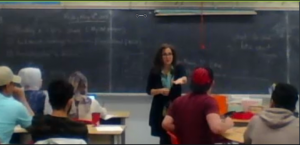 My hope is that we will see some things that will be helpful to the teachers and also discuss things I might want to try differently next time. One of the biggest benefits to this is that we are opening a space for teachers to reflect on teaching practices with their own students in mind. The lesson doesn’t need to be flawless, the point is to be vulnerable so that we can all start taking that approach with our practice. We want students to embrace failure and grow in reflection. That needs to start from the top, I think. In the show I cover the “wins” & some of the debrief with the teachers.
My hope is that we will see some things that will be helpful to the teachers and also discuss things I might want to try differently next time. One of the biggest benefits to this is that we are opening a space for teachers to reflect on teaching practices with their own students in mind. The lesson doesn’t need to be flawless, the point is to be vulnerable so that we can all start taking that approach with our practice. We want students to embrace failure and grow in reflection. That needs to start from the top, I think. In the show I cover the “wins” & some of the debrief with the teachers.
Thanks for tuning in this week.
If you’d like to bring Seidlitz Education consulting to your district, please reach out.
Also, connect with me on Twitter and please come out to see me if you are in one of the locations below in the near future.
Stay Awesome,
Carol
PS: Don’t forget that #MADPD happened last week. You can find all the free YouTube video PD sessions here. 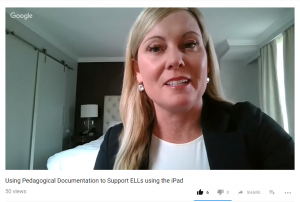 Shout out to Jennifer Hunter-Dillon! Her session was amazing. You can find the ones I did with my students here.
Shout out to Jennifer Hunter-Dillon! Her session was amazing. You can find the ones I did with my students here.
Where you can find me soon:
June 4-5: ESC7 Summer Conerence. Kilgore, Texas (Breakout sessions)
June 19: ESC11 Boosting Achievement Full Day Workshop
June 24-25: ISTE in Chicago, Ill. (Breakout Tech Sessions)
June 29: Keynote at ESC10 BIL/ESL Conference
Summer & Fall 2018: Carolina TESOL Workshops
Oct 4: Rapid Literacy Conference – 1 day workshop in Houston, Texas
Sept 28 – 29: MidTESOL in Kansas City (Breakout Sessions)
NCTE18 in Houston, Texas Nov 2018. Presenting breakouts with Emily Francis & Katie DiGregorio
AbydosCon19, Literacy Conference